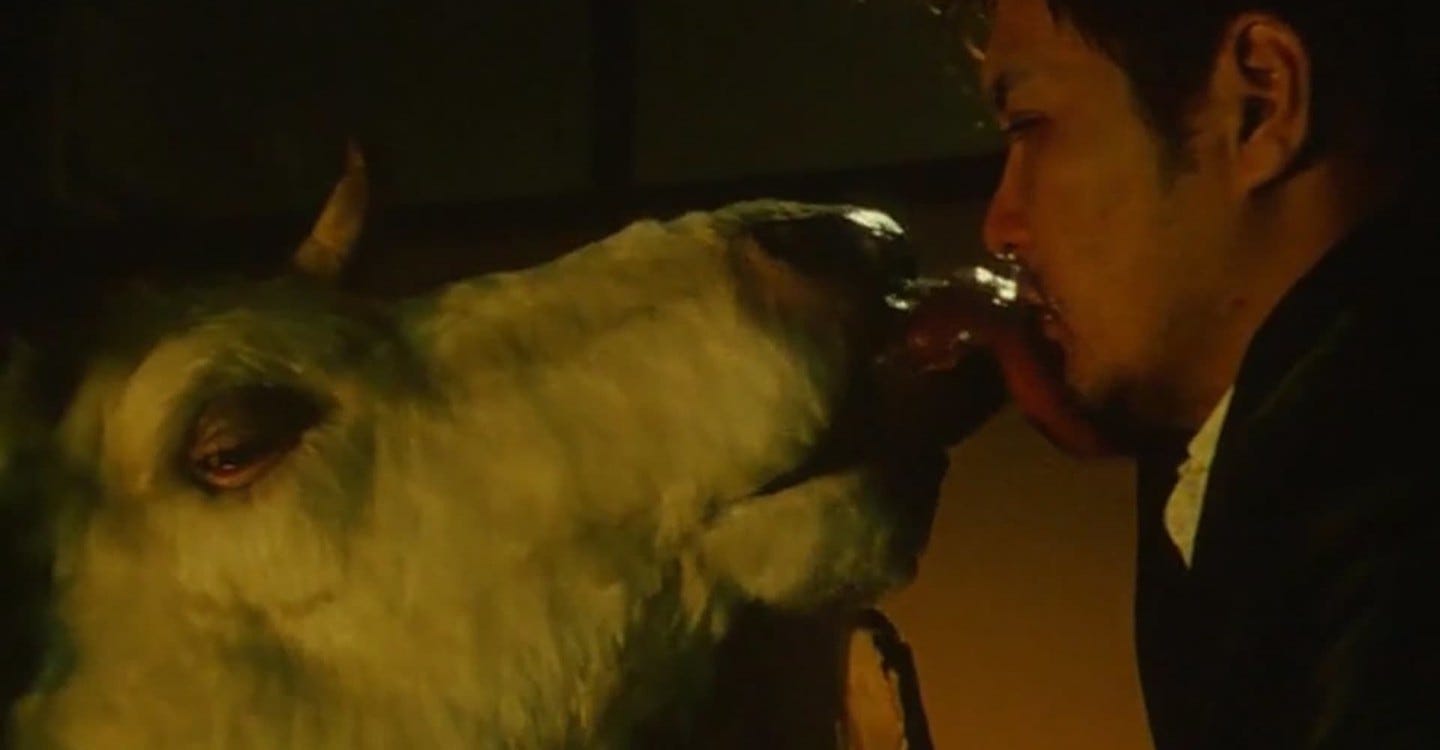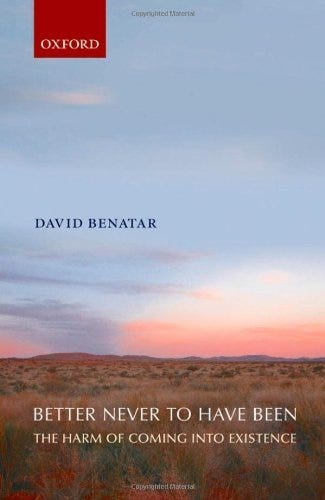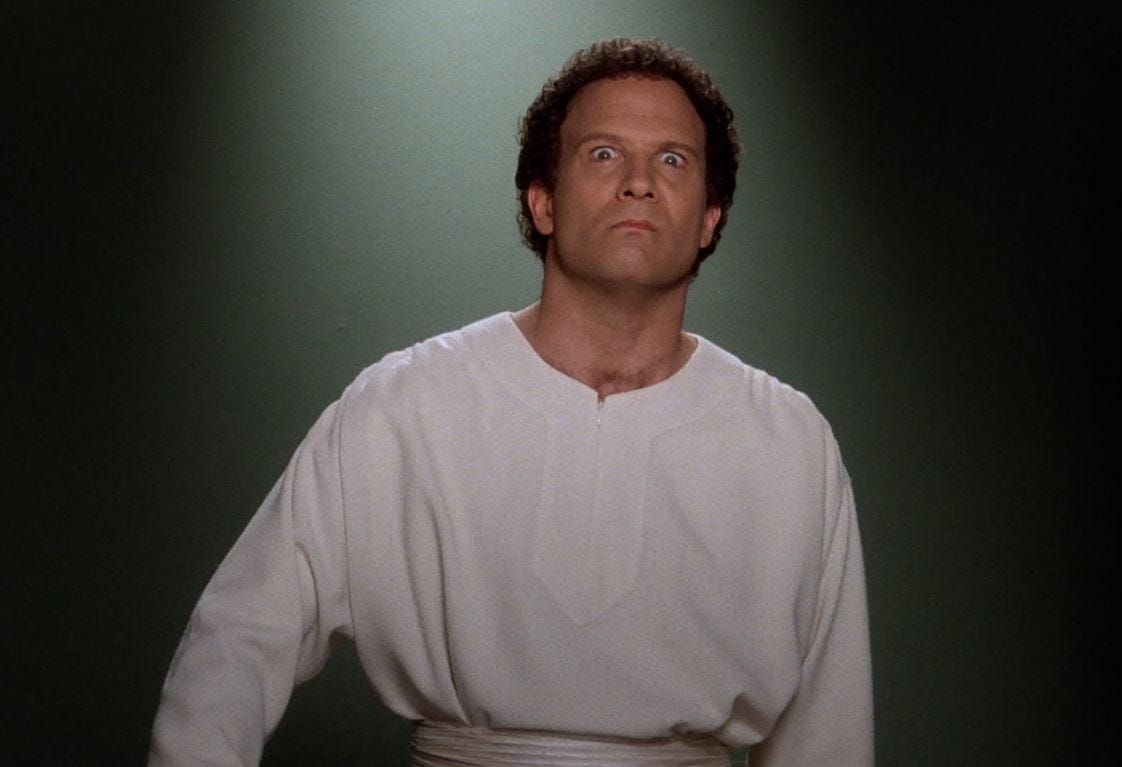Seeing Ghosts
What I’ve Been Watching This Week: This week, I finally investigated free streaming service Tubi, and commenced kicking myself for the amount of time I’ve wasted living a Tubi-free life.
Supported by ads rather than membership sign-ups, Tubi is admirably batshit. Instead of the prestige titles that other services use to lure viewers, Tubi leads with its trash credentials: the first thing that greets you when you hit the homepage is such Z-grade nonsense as The Gingerdead Man and Dreamwork rip-offs like The Great Bear.
But even if you don’t like subjecting yourself to kitsch, zero-budget fever dreams — which, for the record, I totally do — Tubi is still packed with hidden gems. One day, probably pretty soon, I’ll send out a newsletter entirely composed of my Tubi reccomendations, but till then, here are capsule reviews on the great finds I watched or rewatched this week.
Gozu: Japanese auteur Takashi Miike has directed a staggering 82 feature films, most of them gonzo works of horror and the supernatural. Gozu, one of his masterpieces, combines a couple of his interests — the Yakuza, ghosts, and darkly comic bloodbaths. Watch it to have your brain melted.

Gozu
The Demon Seed: Donald Cammel’s reputation might be entirely tied up with his debut, the Mick Jagger-starring cult trip Performance. But his real masterpeice, in my mind, is The Demon Seed, starring Julie Christie. A work of hysterical science fiction about an AI house that starts terrorizing its occupant, it is a Freudian freak-out that veers back and forth between the transcendent and the downright nasty. I won’t give away the central harm that drives the plot, but I do want to give a trigger warning — it’s intense.
The Incubus: John Cassavetes, the noted American auteur, starred in a bunch of horror classics throughout the ‘80s, but perhaps none as underseen or as impressive as The Incubus. I have no idea what this movie is actually about — something something ancient curse something something spate of murders — but it’s the kind of experience that you feel, rather than think, your way through. I can’t reccommend it more highly.
What I’ve Been Reading This Week: You might remember a couple of weeks ago I promised — promised! — that Hilary Mantel, author of the Wolf Hall trilogy, was about to win her third Booker Prize. Maybe I doomed her. We’ll have to wait and see who wins the Booker, but it won’t be Mantel, as she was cut from the race in the move from longlist to shortlist.
It shouldn’t really be surprising, nor particularly tragic. Mantel is a cultural, commercial and critical powerhouse these days — she doesn’t need another award to cement her legacy. And we should always celebrate a Booker shortlist as admirably stuffed with newbies as this year’s. I’m particularly chuffed that Diane Cook’s The New Wilderness has made it almost all the way to the finish line — it’s an excellent work of speculative fiction, equal parts Atwood, JG Ballard and Will Self. I’d highly reccommend it; it’s the kind of book you can fly through in a weekend.
Anyway, perhaps predictably, Mantel’s “snub” caused much grumbling amongst the worst kind of cultural critic — salaried columnists for major newspapers — who decried the “political” move to elevate authors who actually, y’know need the attention of the Booker instead of slinging another one Mantel’s way. Such opinions are not only reactionary, they’re also deeply fucken’ boring. Literary awards establish a critical canon, so of course they’re political. Case closed.

Hilary Mantel
Anyway, all that’s to say the hoo-hah saturated enough of my social media feed that I found myself going back to Mantel (I know that’s ironic, given that I agree with the premise that she’s over-storied in certain circles, but I can’t help how my broken brain works sometimes.) I thought I’d just re-read the beginning of Wolf Hall, but I found myself scooped up by the whole thing, and now I’m re-acquanting myself with her much earlier work, A Place of Greater Safety, about the French revolution.
Wolf Hall is the place to start if you are a newcomer to Mantel’s work. Following the life of Thomas Cromwell, the book is far more beautiful, violent and intelligent than almost any historical novel I’ve ever read. Especially if you’re the kind of person who — like me, before I got into Mantel — thinks that historical novels are over-stuffed and boring, Wolf Hall is just out there, waiting to change your life. Larissa MacFarquhar’s profile of Mantel highlights the author’s main skill as an ability to treat the dead and ghosts with the utmost seriousness. I think that’s bang on the money.
Elsewhere, I’ve also found myself diving back into the work of philosopher David Benatar. Benatar is an anti-natalist, which means he ascribes a negative value to life — he thinks that it’s worse to be born than to never have been born at all. That is, obviously, a wild position, and versions of it get even wilder: there are some anti-natalists, for instance, who think that life is suffering for non-human animals, and therefore that we have an obligation to sterilise every thinking creature on the planet, then ourselves, and in doing so turn off life on Earth, like it was a light switch.

Benatar is a little more nuanced than that. In essence, he thinks that there is an asymmetrical relationship between pleasure and pain. Pain is always bad, he says. Pleasure is always good. The absence of pain is always good. But the absence of pleasure is not always bad. For this reason, he thinks we should all prefer to have never been born.
In a newsletter I sent out earlier this week, I gave a crude rebuttal to this position — for me, pleasure is very, very good, (I love my partner! My books! My cockatoo statute! My dog! etc), and that alone is enough for me to think that I’m glad I was born. But that’s not to say I don’t find Benatar fascinating, and sometimes a little convincing.
His major work of philosophy, Better Never to Have Been, is a full-on read not reccomended for newcomers, but if you want something of a more accessible dive into his thoughts, he recently penned a (very controversial) article for The New York Times that you should absolutely take with a grain of salt, about how our mistreatment of non-human animals made the coronavirus pandemic inevitable.
Two Good Things On The Internet: Earlier this week, filmmaker Ari Aster penned a tribute to the work of comedian Albert Brooks. Aster is the real deal as far as I am concerned — his two features, Hereditary and Midsommar, are some of my favourite films of the last few decades. But I’d reccommend his essay even if you don’t know or like him. It’s an excellent, insightful work of criticism, and a great introduction to the movies that Brooks made throughout the ‘70s and ‘80s. If you have a Criterion Channel subscription, you can then follow up the essay by watching a bunch of Brooks’ films — Defending Your Life is my favourite.

Albert Brooks
A much heavier, but no less insightful essay is this one, written by the model Emily Ratajkowski. An account of some of the trauma that Ratjokowski has endured while working in the industry (big trigger warning for sexual assault), it’s also more broadly about capitalism, the ownership of one’s own image, and “brands”. It is beautifully written — clear and concise in a way that makes me very excited by the fact that Ratajkowski has mentioned she’s written a whole book of such essays which will be released very soon.
A Quick Note: I just want to quickly tackle a couple of logistics about this newsletter. First off, a couple of Gmail users have emailed me and asked how they can stop the newsletter going to the “promotions” tab. Essentially, you’ll need to click and drag this email out of the “promotions” folder, and then up into the main inbox. There’s a more descriptive thread about how to do that here.
Secondly, a note on when the newsletter is going out. The newsletter will always go out on Saturday or Sunday — I think probably Saturday afternoon, from hereon. But there will also be some weeks, like this week, when I’ll write a second piece. I’m going to try and never write three a week, because that just feels like it’d be clogging mailboxes. That second piece will now always come out on a Tuesday or Wednesday. Otherwise, there’s just too many newsletters hitting your inbox too close together.
Thirdly, if you ever want to ask me something — maybe a request for a topic that a newsletter could cover — you can just reply to this email; I get those replies sent straight to me, and would always love to hear from you. Thanks fam; love you!

